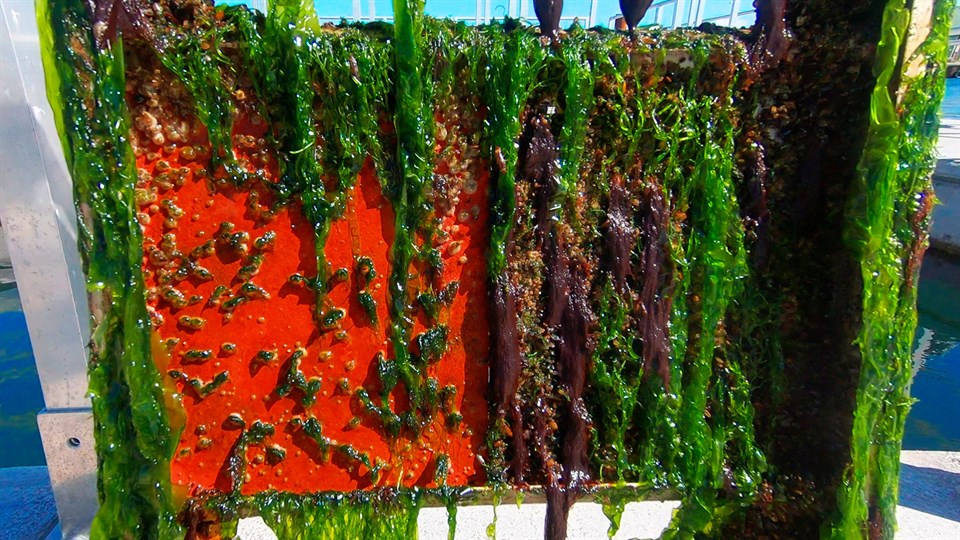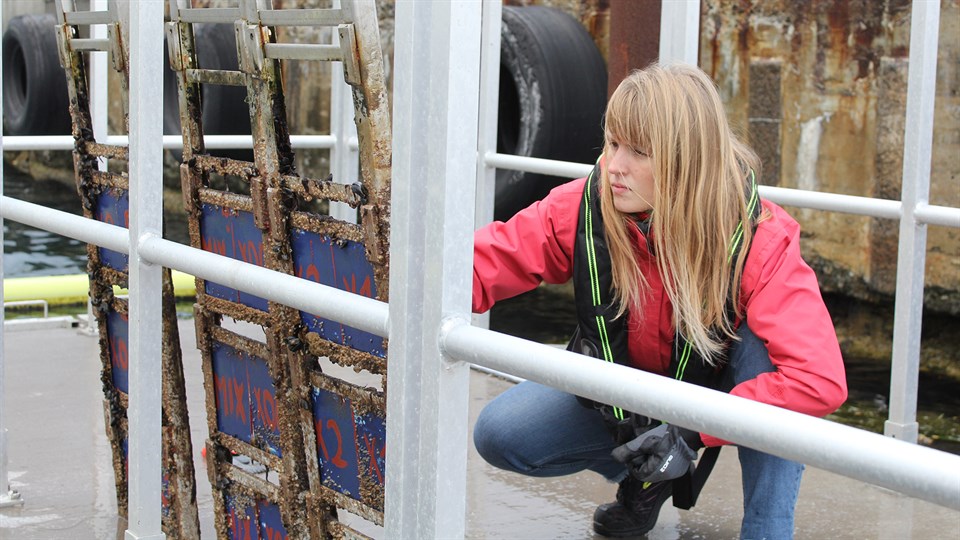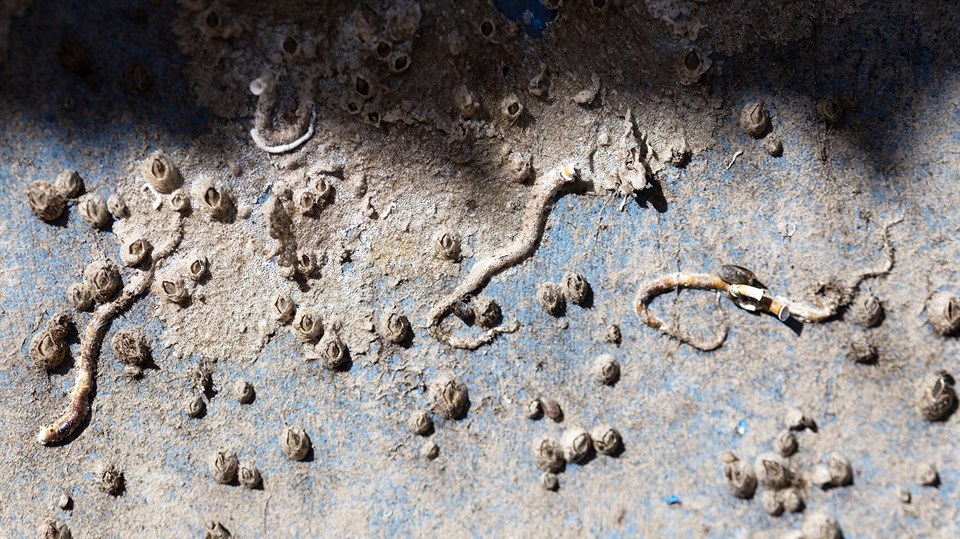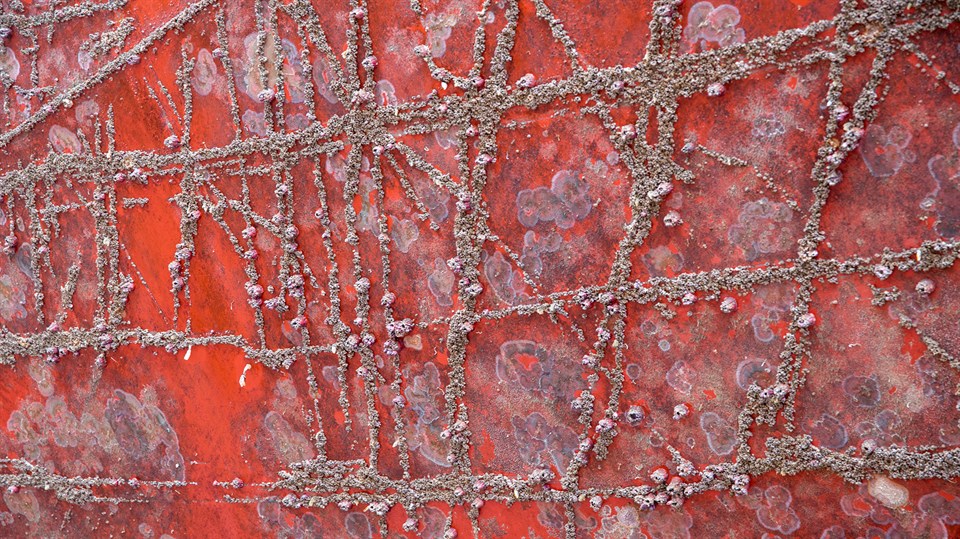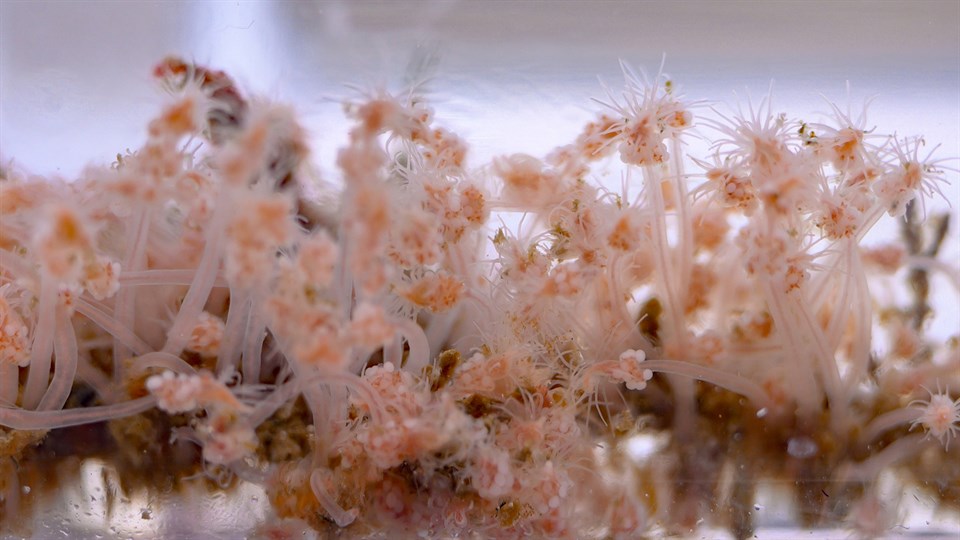Fouling control coatings
A living problem
Marine biofouling is the undesirable colonization of ship hulls and other underwater structures by microorganisms, seaweed and larger animals such as mussels and barnacles.
For fuel driven ships, the consequences of biofouling are:
- Higher fuel consumption and associated emissions of harmful compounds (SO2, NOx, and CO2).
- More frequent dry docking with high costs and generation of toxic waste
- Translocation of invasive species
A mechanical chemical solution
To combat biofouling, fouling control coatings are used. Generally, these are based on one of two principles:
- Chemically active coatings releasing biocides (conventional antifouling)
- Low energy and flexible coatings with no or very little biocide (fouling release)
The main challenge for conventional antifouling is to design a coating with adequate release rates of biocides. Too high a release rate is not sustainable, and a rate too low leads to biofouling. The requirement is a 3-5 years dry docking interval. At the same time, the antifouling coating should provide a smooth, low drag surface during the service period.
For fouling release coatings, the main challenge is to design a smooth coating that remains essentially fouling free without the use of biocides (or very low release rates) over the entire service period. In addition, the coatings should be mechanically strong to avoid formation of cracks and other defects.
Disciplines
The disciplines involved in analysing and understanding the working mechanisms of fouling control coating systems are mainly transport phenomena, colloid and surface science, analytical chemistry, mathematical modelling, polymer chemistry, advanced characterization tools, and ship hydrodynamics.
Projects
Summary
The technology of self-stratifying coatings offers a more sustainable alternative to conventional multilayer coating systems. Once a self-stratifying coating is applied on the substrate, the paint spontaneously separates into multiple coating layers.
Project
Present commercial fouling release coating systems comprise multiple layers, each of which is essential to ensure superior long-term anticorrosive, fouling control and interlayer adhesion properties of the whole system. The partial or even complete substitution of these coating layers with a well-designed self-stratifying coating would yield significant ecological and economic benefits.
The main research objectives are to formulate self-stratifying coatings including the exploration of applicable detection methods for self-stratification, to build a fundamental understanding of the processes being involved and to investigate the unique properties of self-stratifying coatings.
Field and laboratory tests with recurring coating formulation and application optimizations will be a key activity throughout the project. The performance of prototype self-stratifying coatings will be compared to state-of-the-art products.
Funding
Hempel Foundation and the Technical University of Denmark (DTU). The project runs from 15 November 2022 -15 November 2025
Supervisors
- Kim Dam-Johansen
- Søren Kiil
Contact
Luis Heller Student Students s221396@student.dtu.dk
Contact
Kim Dam-Johansen Professor Department of Chemical and Biochemical Engineering KDJ@kt.dtu.dk
The Research project
Biofouling, the accumulation of marine organisms on submerged surfaces, poses a significant challenge for underwater photovoltaic systems, cameras, and sensors by obstructing light transmission, reducing operational efficiency, and increasing maintenance costs. Traditional antifouling coatings are effective in preventing marine fouling; however, they often lack transparency, making them unsuitable for applications where optical clarity is essential.This PhD project focuses on developing innovative transparent antifouling coatings that provide long-term biofouling protection while maintaining optical clarity. The research aims to optimize a self-polishing binder system that enables continuous surface renewal, ensuring sustained antifouling performance over time. Additionally, the incorporation of seawater-soluble nanoparticles, such as nano-Cu₂O and nano-ZnO, is expected to enhance antifouling efficiency. These nanoparticles will be strategically integrated into the coating formulation to release antimicrobial agents gradually, preventing biofouling without compromising optical properties.The outcomes of this study will contribute to the development of next-generation antifouling coatings designed specifically for optical underwater applications. These coatings will enhance the efficiency and longevity of solar-powered AUVs, underwater sensors, and imaging systems by ensuring both effective biofouling resistance and high transparency. By reducing maintenance needs and improving device performance in harsh marine environments, this research offers sustainable solutions for advancing underwater technolog.
Funding
The Office of Naval Research (ONR), US Navy, USA and The Hempel Foundation. The project runs from 1 August 2024 - 31 July 2027.
Supervisors
- Søren Kiil
- Narayanan Rajagopalan
Contact
Zeynep Aydin PhD Student Department of Chemical and Biochemical Engineering zeynay@kt.dtu.dk
Contact
Kim Dam-Johansen Professor Department of Chemical and Biochemical Engineering KDJ@kt.dtu.dk
The Research Project
Biocides in traditional coatings can leach into the ocean, causing toxic effects on marine life, disrupting ecosystems, and reducing biodiversity. By developing biocide-free alternatives the release of harmful chemicals is minimized, promoting healthier marine ecosystems and preserving the quality of ocean waters.
This PhD project focuses on the development of non-biocidal antifouling coatings using hydrogel technology and non-toxic additives. The goal is to control biocide release and eventually replace biocides with safer alternatives. Research includes hydrogel formation, additive/coating/biocide interactions, material characterization, and field performance.
Methods & Approach:
- Optimize hydrogels for controlled biocide release and explore their potential for non-biocidal systems
- Investigate interactions between hydrogels and different self-polishing binders to understand surface behavior
- Identify and test non-toxic agents for effective biofouling prevention
- Evaluate mechanical stability and polishing rates
- Develop analytical methods to study hydrogel structure, properties, and interactions
- Refine biocide release techniques in lab-scale experiments to determine minimum effective doses and reduce environmental impact
- Conduct real-world field testing in Hundred Harbor to validate and accelerate development
Expected Outcome:
The project aims to cut biocide use by at least 50% and eventually create fully biocide-free coatings. It will contribute to the development of novel, non-silicone-based self-polishing antifouling systems with improved durability and efficiency.
Funding
The Hempel Foundation. The project runs from 1 February 2024 - 31 January 2027.
Supervisors
- Kim Dam-Johansen
- Narayanan Rajagopalan
- Markus Schackmann
Contact
Shawn Lindner PhD Student
Contact
Kim Dam-Johansen Professor Department of Chemical and Biochemical Engineering KDJ@kt.dtu.dk
The Project
Fouling control coatings are the primary approach for mitigating biofouling-related issues. A common strategy involves incorporating biocides into the coating matrix to prevent organism attachment. However, growing environmental concerns regarding biocide accumulation and its adverse effects on marine ecosystems have driven the development of biocide-free alternatives in recent years.
To enhance the effectiveness of fouling control coatings and further minimize the impact of biofouling, various cleaning techniques have been introduced. These methods primarily involve the mechanical removal of fouling. While cleaning can be performed during dry docking or anchoring periods, underwater cleaning provides a more cost-effective solution by reducing the need for frequent and costly dry dock maintenance while also extending the lifespan of coatings when done correctly.
The primary objectives of this research project are:
• Developing laboratory-scale underwater cleaning methods for testing fouling control coatings
• Systematic analysis of underwater cleaning strategies
• Evaluation in terms of efficiency, cleaning frequency and environmental impact for underwater cleaning strategies
This research aims to enhance underwater cleaning practices, ensuring both effective biofouling management and environmental sustainability.
Funding
The Hempel Foundation. The project runs from 1 March 2024 - 28 February 2027.
Supervisors
- Kim Dam-Johansen
Contact
Pascal Guth PhD Student
Contact
Kim Dam-Johansen Professor Department of Chemical and Biochemical Engineering KDJ@kt.dtu.dk
Contact
Kim Dam-Johansen Professor Department of Chemical and Biochemical Engineering KDJ@kt.dtu.dk
The present project aims at designing a transparent, anti-fouling coating for use on solar cells and sensors on underwater drones or unmanned underwater vehicles (UUV). Overall, the goal of the coating is to maintain 80% UV and visible light transmission, while staying essentially free of seawater bio-fouling for at least three months of static immersion.
The main technical approaches involve formulating to proper application and film formation, following the transparency development during seawater immersion and evaluating the long term bio-fouling resistance in real seawater at sites in Denmark and USA.
To reach a prototype product in the two years available, coating formulation optimization will be an ongoing and recurring activity throughout the project. If successful for the present target application (transparency and bio-fouling resistance), the new coating formulation may be further developed to also ensure optical transparency, where close to 100 % light transmission is required.
Funding
Office of Naval Research (ONR) - US Navy. The project runs from 1 September 2021- 14 August 2024.
Supervisors
- Narayanan Rajagopalan
- Søren Kiil (PI)
Contact
Narayanan Rajagopalan Assistant Professor Department of Chemical and Biochemical Engineering naraj@kt.dtu.dk
Contact
Søren Kiil Professor Department of Chemical and Biochemical Engineering sk@kt.dtu.dk
Summary
Recent research suggests antifouling paints from ships are releasing harmful microplastics during sailing. The rate and manner of this release are largely unknown. This research aims to quantify and study the release of these antifouling paint particles in controlled lab experiments in order to provide support or possibly suggestions for mitigating the problem.
Project
Microplastics are a ubiquitous and persistant pollutant in the ocean. At high concentrations these micro sized plastic particles can have harmful impacts on ecosystems, marine life and carbon sequestration. To effectively reduce microplastic emissions, the main release pathways must be quantified and understood. This project aims to do this for the release of microplastics from fouling control coatings. These coatings are applied to the hulls of ships in order to prevent adhesion of biological species and reduce the drag resistance. Most of these coatings are antifouling coatings, which mainly consist of plastics and metal biocide particles. In order to understand the release of microplastics from fouling control coatings, a series of laboratory tests will be performed. These mainly consist of:
•Sailing simulations
•Particle analysis
•Material and surface analysis
From this, we will gain knowledge about the release rate and mechanisms of microplastics from antifouling coatings. This knowledge can be applied to evaluate existing and new products, as well as reduce these emissions in the future.
Funding
The Hempel Foundation and the Technical University of Denmark (DTU)
The project runs from 1 February 2023 to 1 February 2026
Supervisors
- Kim Dam-Johansen
- Søren Kiil
Contact
Matthias Bork PhD Student Department of Chemical and Biochemical Engineering merbo@kt.dtu.dk
Contact
Kim Dam-Johansen Professor Department of Chemical and Biochemical Engineering KDJ@kt.dtu.dk
